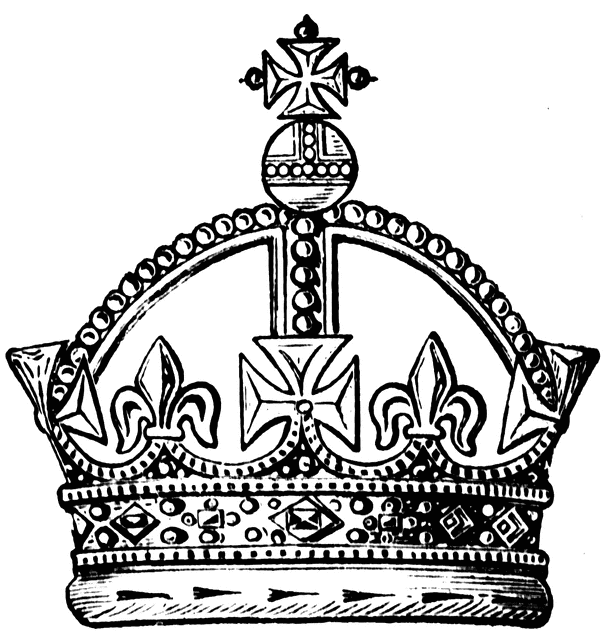Okay, this post is going to deal with a question that has been swanning around on this blogsite for few days--ever since I blogged on Fr Fenton's conversion to Orthodoxy. The topic is: "How do I find the True Church?"
Now, I know that there are plenty of Christians out there for whom this is not an issue. After all, faith is between them and God, and the Church is only incidental to that relationship. Moreover, for these same folk, the True Church of God is an invisible and spiritual entity, indeed, it is an article of faith and not sight, and thus it is folly to seek the True Church in any visible society upon earth.
Well, we aren't going to argue those points. We are going to just take it for granted that folk who think this way are wrong. That's because I largely assume that I am speaking to an audience of Catholics, Orthodox, Lutherans and Anglo-Catholics. (Hullo to any of you reading who don't fall into any of the categories--please excuse me for making such unfounded assumptions).
The Augsburg Confession was pretty right when it said that the One True Church of God "is the assembly of saints in which the Gospel is taught purely and the sacraments are administered rightly". For a given value of "purely" and "rightly", of course.
In fact, Luther was himself pretty spot on with his seven marks of the Church:
the Word, Baptism, Sacrament of the Altar, Office of the Keys, Office of Ministry, Discipleship/Public Worship, and "the cross" (as in the Sign of the Cross and the Theologia Crucis). (There is an interesting book edited by Braaten and Jenson called "
Marks of the Body of Christ" which addresses these "seven marks" from an ecumenical point of view. I haven't read it. Perhaps I should).
The classical Catholic "marks of the Church" are the four Nicene "marks"--ie. Unity, Holiness, Catholicity, and Apostolicity--however, these are more "characteristics" of the True Church than marks by which the Church can be identified (cf. Catechism p. 811).
What I find interesting about the phrase in the Augsburg Confession is that 1) it assumes a visible, congregated community, 2) it defines this community by the "event" of the proclamation of the word and the celebration of the sacraments.
Actually, the first time the question of the "True Church" arose was during the Gnostic controversies in the post-apostolic Church. Ignatius of Antioch, writing to the Smyrnaeans taught that
"Wherever the bishop appears, there let the people be; as wherever Jesus Christ is, there is the Catholic Church. It is not lawful to baptize or give communion without the consent of the bishop. On the other hand, whatever has his approval is pleasing to God. Thus, whatever is done will be safe and valid."
There are a number of ideas operating here at once, including the following:
a) The Church is present where Christ is present
b) Jesus Christ is personally present in the Bishop who acts with Christ's authority
c) the lawful bishop validates the sacramental ministry of the church
Catholic theology has tended to stress Christ's
personal presence in the bishop--but Christ is also present in what the bishop
does: ie. preaching the word and celebrating the sacraments. Here, I believe, there is a real meeting point of Catholic and Lutheran theology.
[I notice however that an additional "mark" of the Church has come to be identified in Catholic theology, namely the ministry of charity, as Benedict XVI says in his encyclical Deus Caritas Est:
"Recently, however, the Directory for the Pastoral Ministry of Bishops explored more specifically the duty of charity as a responsibility incumbent upon the whole Church and upon each Bishop in his Diocese, and it emphasized that the exercise of charity is an action of the Church as such, and that, like the ministry of Word and Sacrament, it too has been an essential part of her mission from the very beginning."]
Orthodox theology, of course, places its stress on the teaching of the True Orthodox Faith as a mark of the True Church, but once again we come back to Ignatius, who stressed that the True Faith is that which is taught by a True Bishop (and vice versa). They also emphasise the Eucharistic aspect of ecclesial communion. Again reflecting Ignatius, they stress that where the true Eucharist is celebrated (by a valid bishop or valid episcopally ordained priest of course), Christ is present, and therefore the Church is present.
So, how does this help us? Well, it helps because we are all looking for the same thing when we are looking for "The True Church", ie. the place where we will hear the Word of God proclaimed in accordance with the True, Catholic and Orthodox Faith, and place where we will receive God's grace through valid and efficacious sacraments.
Where non-episcopal protestants part company with Catholics and Orthodox (and Traditional Anglicanism and St Ignatius too) is that they do not accept that the "pure" preaching of the Word and the "right" administration of the sacraments depends upon the True Apostolic Ministry of the Bishop--although, as I have pointed out, I think this is implicit in the Augsburg formula and also in Luther's insistance that the Office of the Ministry (the
rightly called and ordained pastor) is a true mark fo the Church.
Where some non-Romans get it wrong is that they think that we teach that
communion with the Bishop of Rome is a mark of the True Church. It is not, and cannot be, for the simple fact that anything which is said to be a mark of the Church must necessarily have been there from the beginning, ie. Pentecost, and the Primacy of the Bishop of Rome is a later development. (Nb. I say nothing here of the Petrine ministry, which obviously was an institution of Christ himself, but simply of the exercise of that ministry from the
Roman see). An example of this mistake may be found in the
address of Frank Senn to the 2006 gathering of the Society of the Holy Trinity.There are True local Churches, Churches which have the fullness of the Word, true and valid sacraments of baptism, the Eucharist, and Holy Orders, which are not in communion with the Church of Rome. This lack of communion does not make them any less "true churches".
In this respect, there has been some argument ever since
Dominus Iesus came out, declaring:
With the expression subsistit in, the Second Vatican Council sought to harmonize two doctrinal statements: on the one hand, that the Church of Christ, despite the divisions which exist among Christians, continues to exist fully only in the Catholic Church, and on the other hand, that “outside of her structure, many elements can be found of sanctification and truth”, that is, in those Churches and ecclesial communities which are not yet in full communion with the Catholic Church.
Non-Catholics should note that we do not teach that the True Church of Christ subsists in something called "the
Roman Catholic Church". I have no personal difficulty with the saying that "The Catholic Church
is the True Church of Christ" because I do not understand the word "Catholic" in the narrow sense of "Roman". There are many True local Churches which are part of the universal Catholic Church, of which the Church of Rome (with their bishop Benedict) is just one. The Church of Melbourne, with their bishop Denis, is another. The Ukrainian Eparchy in Australia with their bishop Peter is yet another. The Greek Orthodox Church in Australia with their bishop Stylianos is yet another--although unlike the Church of Melbourne and the Ukrainian Church, they are not in communion with the Church of Rome.
The issue of communion is important because the issue of unity is important. Christ founded one church, not many, and the many local churches--which are the local manifestations of the fullness of the universal church--are impelled by their very nature to be in communion with one another. Ignatius and others located this communion between true churches in the communion or collegium of true bishops. (It is upon this that Eastern Conciliar models of the Church are also built).
The Second Vatican Council, in its decree Unitatis Redintegratio (the Decree on Ecumenism) stated:
"It was to the apostolic college alone, of which Peter is the head, that we believe that our Lord entrusted all the blessings of the New Covenant, in order to establish on earth the one Body of Christ into which all those should be fully incorporated who belong in any way to the People of God."
Here we see that "all the blessings of the New Covenant" for the establishing on earth of "the one Body of Christ" was given to the apostolic college--of whom all validly ordained bishops are the successors. Note that the Petrine ministry is central to that statement above, but not in a "defining" way, ie. not in such a way to define the validity of membership in the apostolic college in terms of the acceptance of the headship of the Peterine minister.
In other words, I want to make two distinctions:
1) between the Church of Rome and the Catholic Church (the term "Roman Catholic" occurs nowhere in my catechism)
2) between that which is of the esse of the Church (valid ministries of word and sacrament and charity) and that which belongs to the absolute imperative of unity of the Church (ie. communion with the See of Peter).
I don't want to downplay the importance of communion with the Bishop of Rome. For me, it is imperative. But such communion can be broken without depriving the schismed group of its character as a "True Local Church". In the end we find ourselves back with Ignatius: The true Church of Jesus Christ is where the True Bishop is to found with his people gathered around him in charity as he preaches the word and celebrates the sacraments.
And there we are not too far away from the Lutheran idea either.


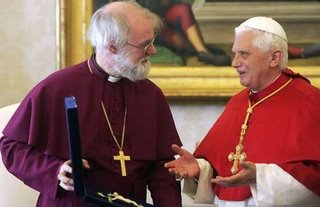

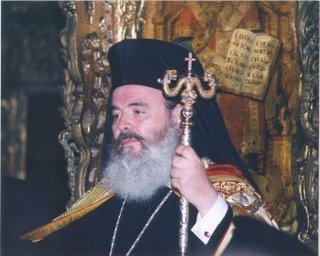
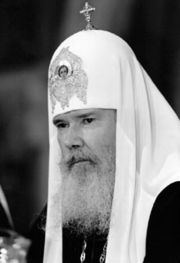
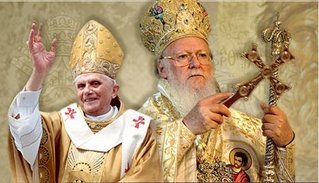




.JPG)






